|
|
|
Sort Order |
|
|
|
Items / Page
|
|
|
|
|
|
|
| Srl | Item |
| 1 |
ID:
172844
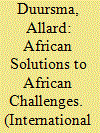

|
|
|
|
|
| Summary/Abstract |
The current scholarly literature on the international mediation of civil wars draws predominantly on a rationalist-materialist perspective. This perspective suggests that the ticket to mediation success is the material manipulation of the bargaining environment by third parties with a high degree of economic and military resources. I argue that legitimacy also determines outcomes of mediation because if a mediator has legitimacy, it can continue to look for a mutually satisfactory outcome and try to pull the conflict parties toward compliance. I show that legitimacy matters by systematically comparing the effectiveness of African and non-African third parties. African third parties are typically considered ineffective because of a low degree of economic and military capacity. However, they effectively mediate civil wars in Africa because of a high degree of legitimacy, which is a result of a strong conviction within the African society of states that African mediation is the most desirable type in conflicts there. Drawing on data from the Uppsala Conflict Data Program supplemented with unique data, which together cover all mediation efforts in Africa between 1960 and 2017, I find quantitative evidence supporting the effectiveness of African third parties. Compared to non-African ones, African third parties are far more likely to conclude negotiated settlements that are more likely to be durable. African third parties are especially effective if the conflict parties are highly committed to the African solutions norm. Theoretically, this study deviates from much of the literature that puts forward solely rationalist-materialist explanations of mediation success. By bringing legitimacy to the forefront, this article supplements the current mediation literature that emphasizes material sources of power and ignores social structures.
|
|
|
|
|
|
|
|
|
|
|
|
|
|
|
|
| 2 |
ID:
172845
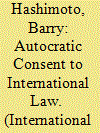

|
|
|
|
|
| Summary/Abstract |
This article contributes to an understanding of why autocrats have accepted the jurisdiction of the International Criminal Court. Leveraging their ability to obstruct their own prosecution, autocrats have traded off the risk of unwanted prosecutions against the deterrent threat that prosecutions pose to political rivals and patrons of their enemies conspiring to oust them. The risk of unwanted prosecutions and the court's deterrent threat both arise because ICC prosecutions credibly communicate guilt for international crimes to capital-disbursing democracies, which may, insofar as possible, use leader-specific economic statecraft to prevent the administration of foreign states by those whom the court signals are guilty of international crimes. Analysis using fixed effects and matching shows that a greater reliance on capital publicly financed by democracies increased the probability that a state accepted the court's jurisdiction only when it was an autocracy (1998–2017). ICC jurisdiction also lengthened the tenure of autocrats and reduced the severity of civil conflict in autocracies.
|
|
|
|
|
|
|
|
|
|
|
|
|
|
|
|
| 3 |
ID:
172847


|
|
|
|
|
| Summary/Abstract |
Terrorists attack civilian targets but there is variation in how many civilians they kill. Terrorists may deliberately harm civilians, or they may adopt a less bloody approach, demolishing businesses, transit systems, and other civilian property while employing tactics to avert civilian casualties. One such tactic is to warn civilians before an attack, allowing them to flee the area. With warnings as an example, this study considers why terrorists might adopt casualty-aversion tactics. An analysis of 12,235 bombings by 131 terrorist groups in the years 1970 to 2016 finds that warnings are most common when terrorists fight democracies and when they lack territorial strongholds. Ideological factors such as religion are not significant predictors of warnings. These findings suggest a need to revisit the claim that religion incentivizes indiscriminate terrorism. They also suggest a strategic logic behind casualty-aversion tactics. Terrorists fighting democracies may spare civilians to appear legitimate in citizens’ eyes. Terrorists without strongholds may spare civilians because they rely on the state's population for support. At first glance, my findings appear to contradict civil war literature arguing that militants with strongholds use violence more discriminately. However, terrorism occurs in areas of state control. Militants with strongholds can use indiscriminate terrorism against state-governed civilians without alienating their own supporters elsewhere.
|
|
|
|
|
|
|
|
|
|
|
|
|
|
|
|
| 4 |
ID:
172841
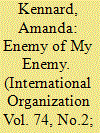

|
|
|
|
|
| Summary/Abstract |
Policies to mitigate global climate change entail significant economic costs. Yet a growing number of firms lobby in favor of regulation to mitigate carbon emissions. Why do firms support environmental regulations that directly increase production costs? This question is all the more puzzling in a globalized economy where regulation may undermine the competitiveness of domestic firms at home and abroad. By imposing differential costs on participants in the domestic market, policies designed to mitigate carbon emissions shift market share toward firms with low anticipated adjustment costs. I develop and test a model of climate change policymaking in the presence of market competition and open borders. Heterogeneity in adjustment costs induces a preference for regulation among low-cost firms. Firms facing import pressure—or export competition—may prefer stringent regulation if costs are sufficiently asymmetric. Firms embedded in global value chains also benefit if regulation raises the costs of domestically produced intermediate goods.
|
|
|
|
|
|
|
|
|
|
|
|
|
|
|
|
| 5 |
ID:
172843
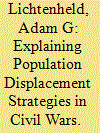

|
|
|
|
|
| Summary/Abstract |
Why do combatants uproot civilians in wartime? In this paper I identify cross-national variation in three population-displacement strategies—cleansing, depopulation, and forced relocation—and test different explanations for their use by state actors. I advance a new “assortative” theory to explain forced relocation, the most common type. I argue that combatants displace not only to expel undesirable populations, but also to identify the undesirables in the first place by forcing people to send signals of loyalty and affiliation based on whether, and to where, they flee. This makes communities more “legible” and facilitates the extraction of rents and recruits. I test these arguments using a novel Strategic Displacement in Civil Conflict data set (1945–2008). Consistent with my expectations, different displacement strategies occur in different contexts and appear to follow different logics. Cleansing is more likely in conventional wars, where territorial conquest takes primacy, while forced relocation is more likely in irregular wars, where identification problems are most acute. The evidence indicates that cleansing follows a logic of punishment. The results for relocation, however, are consistent with the implications of my assortative logic: it is more likely to be employed by resource-constrained incumbents fighting insurgencies in “illegible” areas—rural, peripheral territories. A case study from Uganda based on in-depth fieldwork provides evidence for the assortative mechanism. As the most comprehensive analysis of wartime displacement strategies to date, this paper challenges some core assumptions about a devastating form of contemporary political violence.
|
|
|
|
|
|
|
|
|
|
|
|
|
|
|
|
| 6 |
ID:
172842
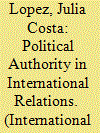

|
|
|
|
|
| Summary/Abstract |
In international relations, accounts of medieval political authority are divided between those who see a heteronomous patchwork of overlapping authorities and those who claim that the era of the state started in the twelfth century. How can we overcome this divide? I argue that IR's current difficulties in grasping the nature of medieval political authority stem from shortcomings in how the notion of political authority itself has been conceptualized. Thus, rather than starting from a substantive definition of political authority, I focus on contestation over the categorization and authorization of rule, that is, on how authority is produced in historically specific ways as a result of contemporary contestation over what political authority is, who is authorized, and how rulers stand in relation to one another. This reorientation allows us to appreciate how medieval political authority emerged from the competition between four sets of ordering categories: iurisdictio, potestas, lord/vassal, and magistrate. Each one of these four categories understood authority, rulers, and the relation between rulers in different ways. The problem with existing accounts of medieval authority is that they attempt to find the single ordering principle of medieval international relations. In doing so, they not only fail to capture the features of the time but also reinforce a particular approach to political authority that is unhelpful for understanding medieval and modern politics alike.
|
|
|
|
|
|
|
|
|
|
|
|
|
|
|
|
| 7 |
ID:
172846
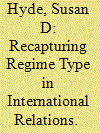

|
|
|
|
|
| Summary/Abstract |
A wave of recent research challenges the role of regime type in international relations. One striking takeaway is that democratic and autocratic leaders can often achieve similar levels of domestic constraint, which in many issue areas results in similar international outcomes—leading many to question traditional views of democracies as distinctive in their international relations. In this review essay, we use recent contributions in the field to build what we call a “malleable constraints” framework, in which all governments have an institutionally defined default level of domestic audience constraint that is generally higher in democracies, but leaders maintain some agency within these institutions and can strategically increase their exposure to or insulation from this constraint. Using this framework, we argue that regime type is still a crucial differentiator in international affairs even if, as recent studies suggest, democratic and autocratic leaders can sometimes be similarly constrained by domestic audiences and thus achieve similar international outcomes. This framework helps reconcile many competing claims in recent scholarship, including the puzzle of why autocracies do not strategically increase domestic audience constraint more often. Just because autocracies can engage audience constraints and democracies can escape them does not mean that they can do so with equal ease, frequency, or risk.
|
|
|
|
|
|
|
|
|
|
|
|
|
|
|
|
|
|
|
|
|